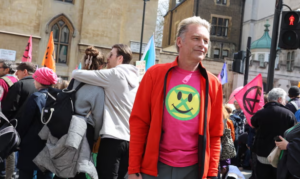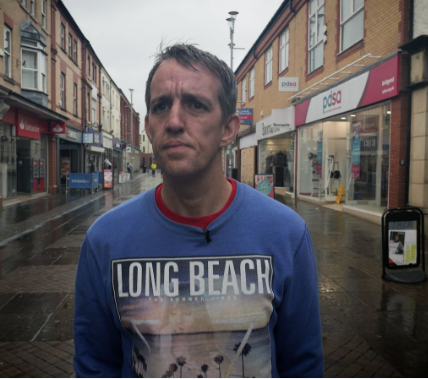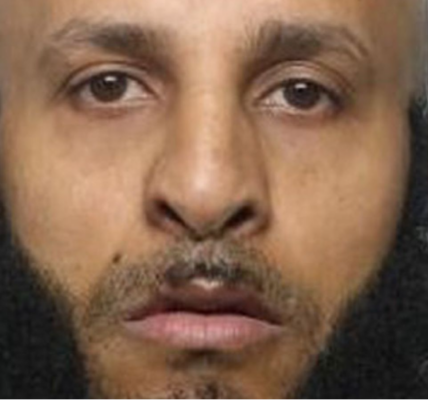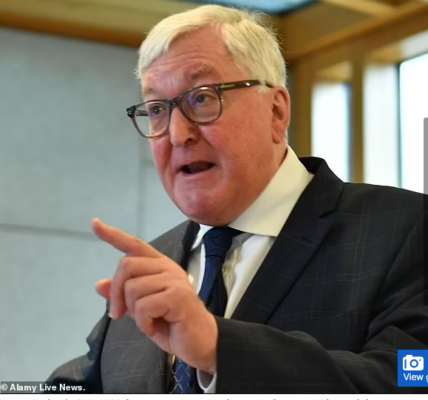Exclusive: Broadcaster joins board of Climate Emergency Fund and says there needs to be new ways of pushing for change

Chris Packham at a protest in Westminster in April 2023. Photograph: Andy Hall/The Observer
Climate activists need to stop blocking roads and start holding fossil fuel executives personally to account, Chris Packham has said, after being appointed to the board of one of the biggest activist funds in the world.
The naturalist and broadcaster is the first non-US-based director of the Climate Emergency Fund, which has given almost $15m (£11.4m) to activists taking part in non-violent civil disobedience around the world since 2019.
Announcing his appointment exclusively to the Guardian, Packham said: “What we’ve got to be clear [about] now is that we need to identify those individuals – because there are so few of them – that are leading us to hell in a handcart.
“We pick on our politicians. We’re quite clear there, if they have policies that are not good, that they are fair targets. But what about all of those people in those corporate industries? Why are the CEOs of those companies essentially faceless?
“I think it’s time to start calling them out, because those real people are causing real damage.”
Rose Abramoff, a climate scientist and board president of the Climate Emergency Fund, said: “We are thrilled to have Chris join our board of directors. He is a perfect fit – a naturalist, a powerful communicator, and a bold supporter of nonviolent disruptive activism.
“Chris is our first UK-based director and our first director outside the US. Climate Emergency Fund has supported activists in the UK since our founding in 2019 – from Extinction Rebellion to Insulate Britain, to Just Stop Oil, This is Rigged, and more. We also have support from an amazing group of UK donors. Chris will be our UK ambassador and help us deepen those relationships.”
Long a strident voice in conservationism, Packham has become increasingly supportive of activist groups. His appointment and comments came as Just Stop Oil and its counterparts across Europe and elsewhere, all funded by CEF, face a crackdown on disruptive protests that has left some serving long jail sentences and campaigns on the verge of proscription.
He said: “I’m constantly in dialogue with these people saying you can’t continue to block roads. You’ve done it. It’s got boring. They’ve found a way of getting round it and now they’re chucking you in jail.
“Stop it. It’s not worth it. You’re losing people off the streets, you’re demoralising those people [and] you’re disengaging other people who previously might have got involved with you. You’ve got to come up with a new method. You’ve got the motivation, you’ve got to concentrate on a method that will control the narrative.”
The kinds of disruptive nonviolent direct action protests such groups carried out remained essential to keep the conversation around the climate and the environmental crises “alive in the public arena”, Packham said.
But he argued there needed to be a “a portfolio of techniques” to push for change. “You need the lobbying, you need the more passive groups, you need the people like Friends of the Earth who are constantly taking court cases,” Packham said.
“But you still need those people to be generating enough newsworthy coverage to keep that conversation in the public domain. My legal cases don’t do that, and nor do Friends of the Earth. They make a difference, but we need that broad portfolio.”
Based in Los Angeles, the CEF was founded in 2019 as a means for philanthropists to finance the burgeoning climate protest movement then spearheaded by groups such as Extinction Rebellion. Big funders include the heiresses Aileen Getty and Abigail Disney, the musician Barbra Streisand and the film director Adam McKay.
Packham said it was McKay who introduced him to CEF, and since then the organisation had been coming to him as an “information source and a barometer” of the state of UK protest. Now he will sit alongside McKay on CEF’s board.
For Packham, it will be one of a number of roles with environmental organisations. He is the president of the Hawk Conservancy Trust, the Bat Conservation Trust, the Hampshire Ornithological Society, the British Trust for Ornithology, the RSPCA and the Southampton Natural History Society, as well as a vice-president of the RSPB, the Wildlife Trusts, Butterfly Conservation, the Brent Lodge Bird & Wildlife Trust, and The Wildfowl and Wetlands Trust.
He accepted that “potentially” conflicts could arise between those jobs and his new role, “but I frankly just can’t worry about it, can I? I can’t be worried about what Tim Bonner from the Countryside Alliance is saying because he’s still desperately trying to prop up foxhunting, which is absurd. And I don’t care what the Daily Mail says and I don’t care what the Spectator and the Telegraph say.
“I have a duty, I can’t be swayed from that duty and I think that I can enhance my portfolio to instigate positive change by supporting Climate Emergency Fund.”




